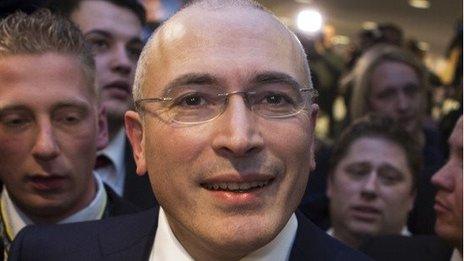Khodorkovsky's clemency leaves Putin-watchers speculating
- Published
- comments

Questions surround Mikhail Khodorkovsky's recent release from a Russian prison
Russian President Vladimir Putin is either at the top of his game or desperately trying to keep his country afloat. He either doesn't care what the world thinks or is seeking to court global opinion.
Now that Mikhail Khodorkovsky is free from prison, commentators are wondering what the decision to grant clemency to the former Yukos oil tycoon says about Mr Putin.
Government-aligned media in Russia are hailing the news as a sign of Russian President Vladimir Putin's strength.
"Being free is better than being not free, being merciful is better than being not merciful," writes Vladislav Vdovin in Izvestiya, external. "Vladimir Vladimirovich Putin becomes a moral winner in this long story about the Yukos founder's disgrace."
RT's Peter Lavelle calls Khodorkovsky a criminal who was, and is, not a threat to Mr Putin.
"There is nothing special about Khodorkovsky beyond his greed and hubris," he writes, external. "Putin apparently believes Khodorkovsky served enough time thinking about both."
In Moskovsky Komsomolets, Mikhail Rostovskiy writes, external that he hopes Khodorkovsky will keep his pledge to stay out of Russian politics, "because the last time Khodorkovsky tried to do it, nothing good turned out of it".
Others in the Russian media were more critical of Mr Putin.
"All the recent developments around Mikhail Khodorkovsky's release have proved that his persecution was politically motivated," write, external the editors of Vedomosti, external. "In fact Khodorkovsky has been sent out of the country just like the authorities did with dissidents during the Soviet era. One can say that Khodorkovsky is the new image of a dissident: in the Soviet time they were writers and human rights activists, whereas in Putin's time they are businessmen. The image corresponds with the authorities' goals: now they aim for assets but not ideology."
Vladimir Ryzhkov in the Moscow Times has a more upbeat view, however. "Now that Khodorkovsky is free, it will make it much more difficult for the Kremlin to concoct new fabricated court cases like the one against Yukos," he writes, external. "His authority will help move Russia toward greater freedom, democracy, open society and the rule of law. Ten years ago, Khodorkovsky's arrest changed Russia for the worse. Now his release will change it for the better.
Elsewhere in the world, some commentators view Mr Putin's actions in a pragmatic light.
"No-one following Russian politics can seriously entertain the idea that Putin's pardon of Khodorkovsky marks a sea change away from an ultra-conservative autocracy toward a more democratic mode of government with a strong, independent judiciary," write, external the editors of the Jerusalem Post. "At most the move is nothing more than a begrudging concession to world opinion as Russia prepares to host the Winter Olympics."
France 24's Douglas Herbert writes, external: "It would take a very charitable soul indeed to argue that Putin was acting out of the kindness of his heart in releasing a man for whom he's harboured little more than hatred."
Sochi may be the goal of Mr Putin's recent moves, but the reality is that nothing has changed for those living in Russia, writes, external Masha Gessen:
Sending different messages to the international and domestic audiences is precisely the point of Putin's latest maneuverings and of many of his policies generally. In an effort to make sure that the Olympic Games in Sochi in February go off smoothly, Putin is showing a friendly face to the West, demonstrating that he has heard the criticism directed at him. To the audience at home, the message is, protest and disobedience will be punished harshly.
David Clark in the Independent notes that Putin could have pressed for new charges to keep Khodorkovsky in prison beyond the 10 months that remained on his sentence: "He eventually decided that the costs of doing so would outweigh the benefits and chose to take credit for his early release instead."
Mr Putin, he writes, external, reflects that the Russian president is grappling with how to lead his nation during a time of economic and political instability.
"The dilemma of mature Putinism as it considers the future and its legacy for Russia is the choice between repression and reform," he writes. "One raises the spectre of losing control and paving the way for anarchy, as Mikhail Gorbachev's perestroika reforms eventually did. The other involves the risk of holding on too tight and sharing the fate of Hosni Mubarak by provoking an even stronger backlash at some point in the future."
His presidency is in the balance. Or it's not. Forgiveness and mercy are two attributes that commentators normally have not associated with Mr Putin, so his recent actions have left many searching for answers.
(From reports provided by BBC Monitoring, external)
- Published22 December 2013
- Published20 December 2013
- Published22 December 2013
- Published22 December 2013